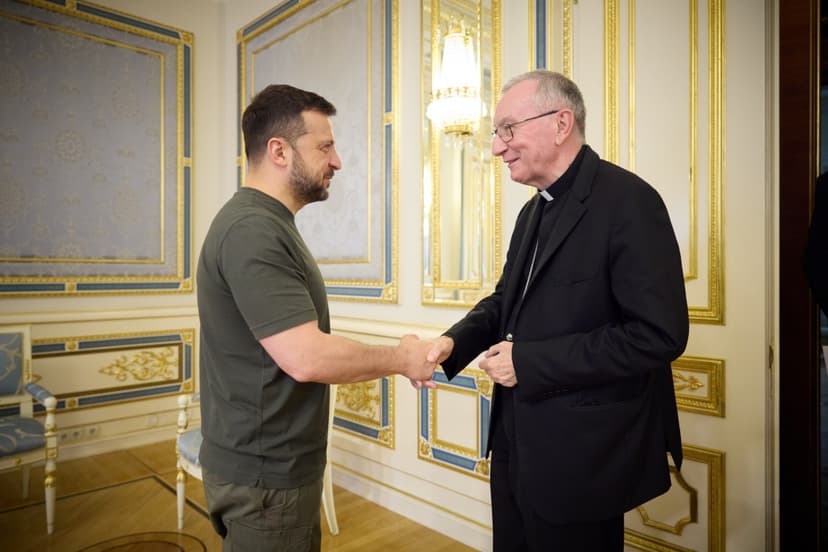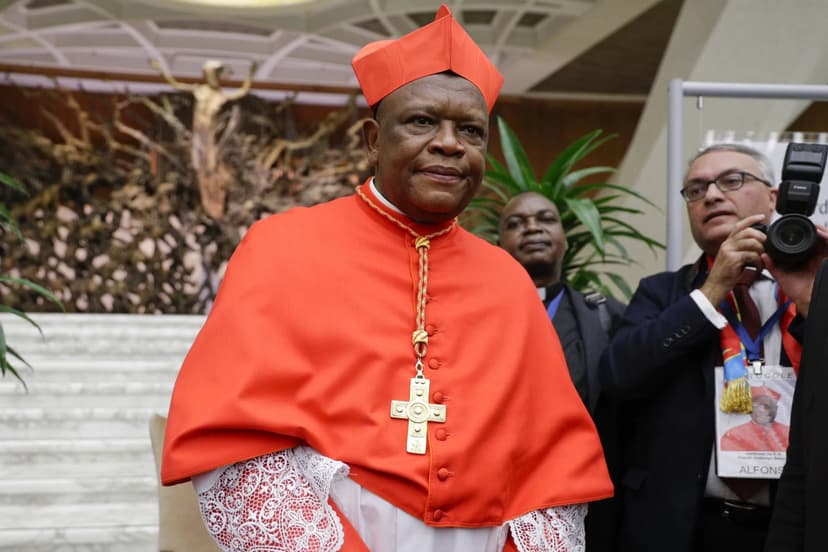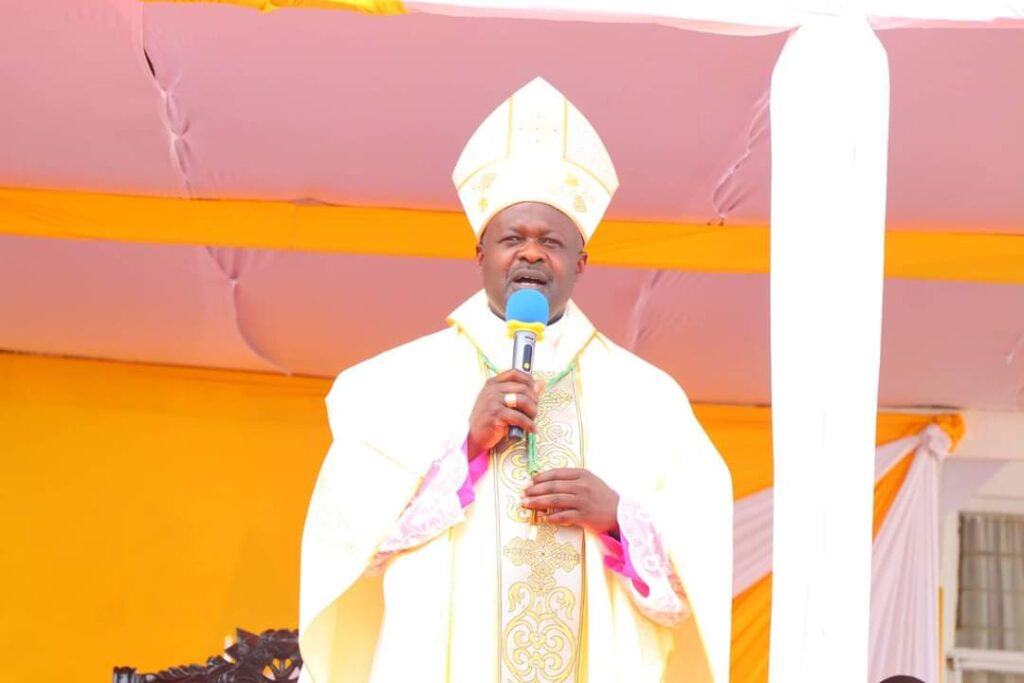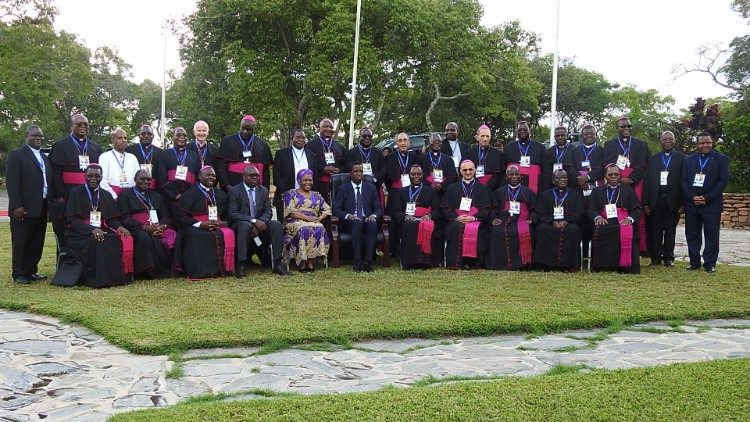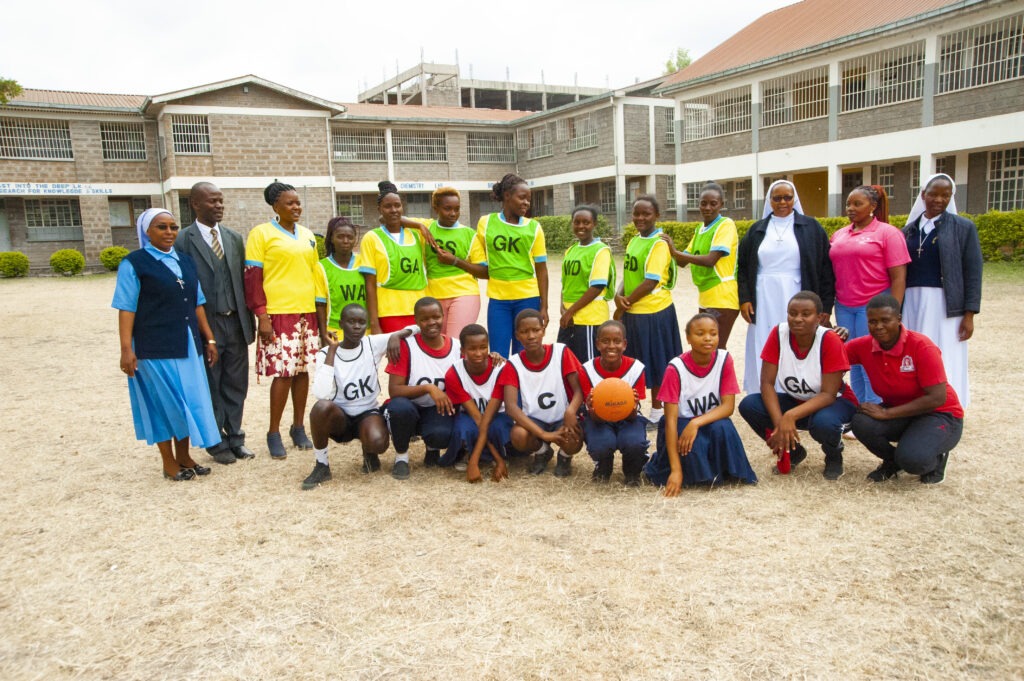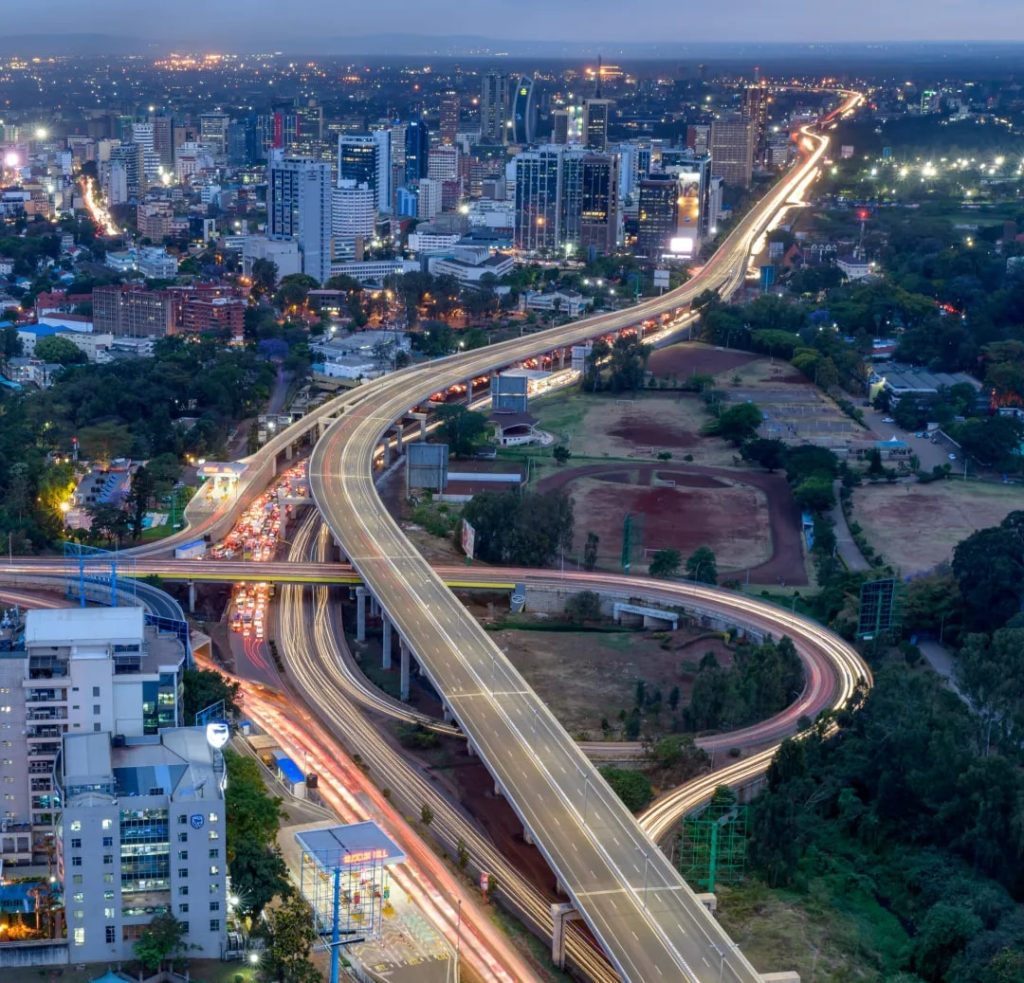The Synod of Bishops on Synodality, convened in Rome from 4th to 29th October, 2023, brought together participants from diverse backgrounds and competencies. Notably, and marking a historical moment, selected non-bishop participants took part in this synod. Among them was Fr. Andrew Kaufa, SMM, the Social Communications Coordinator at the Association of Member Episcopal Conferences of Eastern Africa (AMECEA) and a Consultant in the Vatican’s Dicastery of Communications. He graciously shared his positive experience with New People.
Fr. Andrew Kaufa, SMM
Many non-bishop participants at the 16th General Assembly of the Synod of Bishops, held at the Vatican from 4th to 29th October, 2023, expressed gratitude to Pope Francis, considering their nomination an honour by the Holy Father. In fact, one participant said, “I feel honoured to enter into the history of the Church as one of the synod fathers and mothers.” During the opening session, Pope Francis reminded all participants that being part of this process as God’s people “is in itself a gift received from God for others, a gift received with responsibility.” This article draws from Pope Francis’ position to share that beautiful experience from the perspective of a collaborator to the General Secretariat of the Synod. At the end, an attempt will be made to draw some implications for the Church in Africa.
- Key Experiences
Basically, three key experiences need acknowledgment: firstly, the inclusive approach of the Synod on Synodality, which raised questions regarding the legitimacy of the assembly as a Synod of Bishops; secondly, the emphasis on listening to the Holy Spirit, who is the protagonist of the Synod, turning the assembly away from the summit approach to more of a retreat mode; and finally, the question of confidentiality, which did not sit well with the media fraternity.
- a) Leave No One Behind
Presided over by the Holy Father himself, the 16th General Assembly of the Synod of Bishops on Synodality became historical as, for the first time, it included non-bishops appointed by the Holy Father. These included patriarchs and bishops of the Eastern Catholic Church, clerics belonging to institutes of Consecrated life, non-bishop clerics, women belonging to institutes of Consecrated Life, and the laity, including men, women, and youth selected for their competence in the matters at hand. In his opening speech on Wednesday, 4th October, 2023, Pope Francis said, “Synod is an expression of the nature, form, style, and mission of the Church.”
In other words, the inclusivity experienced at the assembly began at the initial stage of the synodal process, involving all the people of God at the diocesan level. Therefore, the participants from Africa, namely: 53 bishops, 6 priests, 6 nuns, and 2 laywomen, reflected the participation of the entire Church on the continent, joining other participants from around the world. According to the General Relator of the Synod, Cardinal Jean-Claude Hollerich, this solidified the episcopal nature of the Synod of Bishops as a visible sign of the unity of the people of God.
This “forgotten” principle aligns with the Second Vatican Council’s Constitution of the Church, Lumen Gentium, (Light of the Nations) and became an issue, causing discomfort among some participants. They questioned whether the assembly should be called a ‘General Assembly of the Synod of Bishops on Synodality’ or simply a ‘General Assembly on Synodality.’ Again, near the end of the synod, before voting on the synthesized report, Cardinal Hollerich explained that, in the context of a synod focusing on journeying together as a Church, some modifications were inevitable. Pope Francis’ position referred to Lumen Gentium #23, Canon #346, and the Apostolic Constitution Episcopalis Communio (Episcopal Communion). This clarification eased concerns about the composition, emphasizing that the episcopal nature of the Synod of Synodality was not compromised by the admission of non-bishop participants. As a participant, this was a beautiful experience, learning that genuine dialogue on matters affecting the Church is the way of being a family of God.
- b) Spiritual Conversation
Observations during the continental celebration in Addis Ababa, Ethiopia, and throughout the synod assembly in Rome highlighted the significance of the methodology of Spiritual Conversation. Despite initial difficulties in understanding the methodology, which some participants found distracting, it became evident by the end of the assembly that all participants appreciated it. Mother Angeline cautioned that the methodology might induce a sense of confusion, fear, and uncertainty. She advised participants to approach the synodal assembly “with the sense of freedom and openness of a child.” Additionally, Fr. Timothy Radcliffe’s meditation on the Transfiguration emphasized to participants the importance of hope while journeying together, as opposed to fear.
Spiritual conversation, as outlined in the guidelines released by the Synod’s General Secretariat, emphasizes that participants should focus on actively listening to the Holy Spirit and to one another without judgment. The quality of words spoken and the feelings expressed by each individual during working groups and congregations is also paramount. In essence, the method aims to create an atmosphere of prayer, trust, and openness, allowing everyone the freedom to speak. This explains why at least two hours per module were dedicated to personal prayer and preparation, why there were three rounds of 12-member working groups per module, why sharing personal reflections was necessary, and why moments of silence were integrated with sharing in the working groups and during congregations. All of this was done with the awareness that God, through the Holy Spirit, is intricately involved in the entire process.
Interestingly, even though silent meditation proved challenging, especially for lay participants, one might assume it would be easier for bishops, clergy, and consecrated religious men and women. From my observation, this does not seem to be the case. Apparently, listening is difficult, while talking is much easier. Some participants felt that it took too long before they could speak on issues that had already dominated the media and public debates, forgetting that the main agenda was actually ‘synodality.’
Talking about listening to the Holy Spirit, a journalist raised concerns during the first press briefing at Sala Stampa. She wondered if the talk about spiritual conversation was a way of preventing people from discussing the issues. “Is this not a way to stop them from speaking so that they listen only to the Holy Father who is being disguised as the Holy Spirit?” she asked. This observation highlights the fact that discernment of the Spirit might be easier for the Jesuits, whose spirituality already integrates the practice, than for the non-Jesuits.
- c) The Discipline of Confidentiality
Pope Francis emphasized the importance of silence and spoke about media fasting. What exactly did he mean? Does it mean that participants should switch off their mobile phones and laptops, refraining from any conversations with those outside the hall? Does it mean participants must decline interviews with journalists? If anyone struggled to understand and appreciate this directive, it was probably the communication collaborators at the synod rather than the participants themselves. As communicators, they were aware that in a digital environment where transparency and accountability are imperative for the Church, giving the media a blackout could backfire against the Holy Father, whom journalists appreciate for his open-mindedness.
While some referred to it as Church secrecy, the General Secretariat of the Synod preferred to term it confidentiality. According to the Secretariat, confidentiality during the synod, which simply meant keeping conversations private until the appropriate time, does not equate to secrecy, carrying connotations of hiding information. Therefore, just as during bishops’ plenaries and general chapters of religious congregations, confidentiality is observed for several reasons, including encouraging participants to openly, honestly, and freely express their opinions without fear of repercussions. Participants found that confidentiality, combined with moments of silence and prayer, ensured that amidst diverse opinions, an atmosphere of mutual respect was fostered, crucial for the discernment process. On this note, one participant said, “I now can believe that the Holy Spirit is with us because despite the many points of diversion, we are able to listen to each other in an atmosphere of openness and build consensus on the issues.”
- Implications
In this part of the discussion, we will examine each of the lessons in the order above and draw some implications for the synodal Church in Africa.
- a) Inclusivity in Decision-Making Fora
A strong message from the assembly is that it is possible for all members of the Church, at all levels, to come together as a family of God, discuss issues affecting their life from their contexts, and come up with a consensus opinion that will help the authorities make decisions. The point of reference here is the experience of the Pope, cardinals, bishops, clergy, consecrated men and women, laity, and youth sitting around a table in the Paul VI Hall. Most participants expressed that this inclusive approach of the synod is rare in the Church, especially at that high level of decision-making.
In the AMECEA region (the Association of Member Episcopal Conferences in Eastern Africa) for instance, it is only the Tanzania Episcopal Conference (TEC) where the bishops’ plenary assemblies include non-bishops. This observation stems from personal experience in 2021 when the AMECEA Secretariat met with the Tanzania Episcopal Conference and the local organizing committee for AMECEA’s 20th plenary assembly. The bishops’ plenary assembly process involves the standing committee of the bishops’ conference, representatives of consecrated men and women, the laity, and the youth through the leadership of their associations. These groups meet before the bishops’ plenary assembly to study and discuss the agenda items. When it is time for the plenary, all participants are divided into groups gathered around tables, ensuring that bishops are mixed with the non-bishop delegates in the working groups.
Whether this way of conducting bishops’ plenary assemblies diminishes the importance or authority of bishops, the Church in Tanzania can help us answer the question. The decision made by Pope Francis to take this inclusive approach in consulting the Church as people of God reinforces the very inclusive nature of the synod’s topic—synodality, or rather, journeying together as members of the family of God, where some are ordained, others are not; some are male, others are female; some are old, others are young. This justifies any parish, diocese, or conference that opts to reconsider its way of consulting on pastoral issues affecting the life of the Church in its local context. After all, the synod underscores the need to evaluate how local churches have integrated the understanding of the Church as given during the Second Vatican Council and decreed in the Constitution of the Church (Lumen Gentium).
- b) Embracing Spiritual Conversation
Several reasons justify the necessity of the spiritual conversation methodology as a tool for discernment. Firstly, the method’s emphasis on the Holy Spirit and active listening led participants to realize that the assembly became a learning experience about the universal Church, whose members hail from diverse backgrounds. It would be naive to assume that clergy and consecrated individuals, who invest years in their formation to learn various prayer methods, would be on the same page as the laity, who often lack similar opportunities.
Similarly, one might expect that younger participants struggled more with the spiritual conversation method than their older counterparts, although spiritual maturity does not automatically come with age. Overall, the significance of SECAM (the Symposium of Episcopal Conferences of Africa and Madagascar) organizing a preparatory meeting for African participants at the Mariapolis Retreat Centre, Nairobi, should be acknowledged. This meeting provided all African participants with their first experience of spiritual conversation before traveling to Rome. This highlights the need for the Church in Africa to invest in the formation of pastoral agents, laity, and youth in the methodology of spiritual conversation if synodality is to be embraced by the entire family of God.
Secondly, it is a reality that constraints accompany any methodology built on structured conversations, including resistance from those accustomed to past approaches. According to E. M. Rogers (an American communication theorist and sociologist) resistance to new ideas, practices, or products is typical human behaviour. This was evident with spiritual conversation, which tested the patience of participants familiar with previous ways of facilitating Synods of Bishops. Some expressed that the methodology limits the flow of the conversation.
Consider the fact that there were numerous journalists and lobby groups outside the assembly who believed that participants had gathered not so much to discuss how to journey together as a Church but rather to debate whether the Church should open up to LGBTQ issues and the ordination of women. In such a scenario, it is not surprising that those newly introduced to the methodology felt that the protocol and procedures involved in spiritual conversation were more obstructive than helpful in addressing these pertinent issues. This observation calls for reflection on how much the Holy Spirit is invited into the decision-making structures of the Church or, rather, how much spiritual conversation is practiced in the Church.
Despite the difficulties with the methodology, it is encouraging that participants returned home grateful to the organizers for introducing them to the methodology. They were convinced that spiritual conversation is possible and that it is the path to follow for a synodal Church. It is no wonder that, in the end, the synthesized report recommends that the Church begins to walk the synodal path, but first by investing in the formation of all the people of God, particularly those in houses of formation.
c The Discipline of Confidentiality
It is a common practice across various cultures that certain discussions remain confidential until an appropriate time for public disclosure. This is not to canonize and should not be confused with practices in some African secret societies where rituals and information are concealed from those who have not undergone initiation. In the Church, all baptized members are initiated into a new life in Christ. Despite the equal dignity shared by all Christians through Baptism, various stories circulated about the Church, particularly regarding issues like LGBTQ and the ordination of women before the document’s voting, were misleading.
Although met with initial skepticism, confidentiality proved essential for the General Secretariat and participants to ensure that information about the assembly proceedings originated from one credible source—the Secretariat. While confidentiality is a standard practice fostering an environment for free, open discussion, principles of accountability and transparency compel the Church to resist the temptation of secrecy. Instead, the Church in Africa should establish credible sources of information accessible to journalists and the entire family of God.
Conclusion
The positive experience described above provides a glimpse of what being synodal entails. The harmony witnessed during the October 2023 synodal assembly aligns with Saint Basil’s vision of a Church as “a single harmony in many voices brought about by the Holy Spirit.” Consequently, the way forward for the Church in Africa involves ensuring that the spirit of synodality continues to be instilled through the recommended processes by the Synod’s General Secretariat between now and the second gathering scheduled for October 2024. At the same time, recognizing that formation on synodality will become a key agenda at the end of the 16th Ordinary General Assembly of Bishops on Synodality, conferences could establish teams of experts to commence the production of resources required for educating the people of God at all levels.


